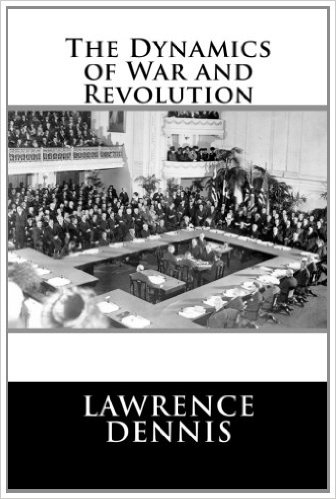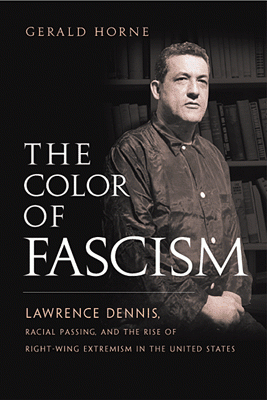December 25, Christmas Day, is also the birthday of one of the most exotic and courageous thinkers ever to stride across the American political stage: Lawrence Dennis.
Now, there are three basic facts everyone learns about Mr. Dennis at the outset.
One: he was a leading Right-wing economic and political theorist of the 1930s and ’40s—an American fascist if you will. And he got caught up the the “Great Sedition Trial of 1944” (a trial that ended inconclusively when Judge Edward Eicher, a former Iowa congressman, suddenly dropped dead and no one cared to reconvene proceedings).
 Two: Lawrence Dennis was part African-American, a fact that was marginally believable at first glance, given his “swarthy” or “bronzed” complexion and short, wiry hair. Dennis could “pass for white” if he wanted to, and so he did for several decades. But this was mainly for reasons of convenience. During his years at Exeter, Harvard, the diplomatic corps, and Wall Street, talking about a mulatto heritage was just an unnecessary complication, and so he didn’t. At the end of the day there is no reason to believe he was ashamed of his mixed-race heritage; it is said that when he died in his eighties he was sporting an afro [2].
Two: Lawrence Dennis was part African-American, a fact that was marginally believable at first glance, given his “swarthy” or “bronzed” complexion and short, wiry hair. Dennis could “pass for white” if he wanted to, and so he did for several decades. But this was mainly for reasons of convenience. During his years at Exeter, Harvard, the diplomatic corps, and Wall Street, talking about a mulatto heritage was just an unnecessary complication, and so he didn’t. At the end of the day there is no reason to believe he was ashamed of his mixed-race heritage; it is said that when he died in his eighties he was sporting an afro [2].
Dennis’s racial mixture, coupled with his radical-right politics, confounds political historians on the Left. They have no trouble dealing with the fact that W. E. B. DuBois, another light-skinned mulatto, went to Harvard and later joined the Communist Party USA. But to imagine another light-skinned man of Negro heritage was a fascist? And not only an American fascist, but former diplomat and famous diplomatic theorist. In 2007 a biography of Dennis was a published with the title of The Color of Fascism.[1] As one might expect from that lurid title, the publisher promoted the bio as a racial saga: a story of “deception” and hypocrisy and living in shame among virulent hatemongers.
But now we come to the third remarkable thing about Lawrence Dennis—maybe the weirdest fact of all. He had been a baby celebrity, a child preacher.
At the end of the 19th century, newspapers in New York and Chicago were fascinated by the something of this infant phenomenon, “Larney Dennis”—the Child Prodigy from Georgia, come to save yo’ souls!
Decades later, the whole notion of a colored moppet haranguing the sinners would become a routine item on the church-vaudeville circuit (Rev. Al Sharpton started out this way). But in the late 1890s this little hi-yaller preaching prodigy with the white frock and booming voice was one-of-a-kind, a huge drawing card:
“Pray! Pray! Down on yo’ knees and pray!”
A child’s quivering tones, yet instinct with power. Above a tiny form in shot white frock with a strange majesty in the upraised olive face and small commanding hand. Below a vast multitude of more than three thousand souls, curious, cynical, devout; yet all, believer and scoffer, alike, held in sway by this morsel of humanity.
In a word, Lawrence Dennis, the negro baby evangelist, was before his first New York audience at the Mount Olivet Baptist Church in West Fifty-third street this afternoon enacting one of the most remarkable scenes in the shifting life of the great metropolis.
Long before 4, the hour named for the service, the church was packed…
Little Lawrence shook the black curls confined at either side of his head with a pink ribbon and looked expectantly about.
“I am 5 years old,” in reply to the first query, “and I was bo’n on the 25th of December, Christ’s birthday.”
***
“Why are you here?” cried a negress from the middle of the house.
“To save New York,” ejaculated the preacher. “I’se got to save you goats.”
(Chicago Tribune, January 8, 1899)
 A most bizarre start in life for a diplomat, or Wall Street investment banker, or fascist economic theorist—all of which Dennis would be in the 1920s and ’30s.
A most bizarre start in life for a diplomat, or Wall Street investment banker, or fascist economic theorist—all of which Dennis would be in the 1920s and ’30s.
It all seems mythical, this story of the white-frocked child evangelist; so disconnected is it from Dennis’s adult careers. A bit like the Homeric story of Achilles on Skyros, disguised as a princess so he wouldn’t have to die in the Trojan Wars as prophecy predicted. (As you may recall, this experience gave Achilles such a tough hide that he went off and died in the Trojan Wars anyway.)
Lawrence Dennis’s break with his past came in his mid-teens, and it was drastic. He went to prep school at Philips Exeter and pretty much swept his childhood fame and negritude under the rug. He was a star debater at Exeter and then at Harvard College, where he crash-coursed an accelerated A.B. degree in two-and-a-half years. (This was rather less difficult than it sounds today: during the Great War, Harvard and Yale handed out course credits like doughnuts, so the boys could get to France, or come back and graduate without much effort.)
After that, it was the Foreign Service corps for Dennis, in Haiti, Romania, and Central America. It seems to be his time in Honduras and Nicaragua that radicalized this rising young diplomat. It became clear to him that Central America and the Caribbean—most of the Americas in fact—were the playthings, the game-board of the U.S. State Department and, ultimately, Wall Street. He tried to publish articles about revolutions in Honduras and Nicaragua in the Atlantic Monthly and Foreign Affairs, but Foggy Bottom embargoed them.[3]
Rather ironically, Dennis thereupon left the State Department and went to work for the Guaranty Trust Company for a while,[4] followed by the J. & W. Seligman investment bankers. Seligman sent Dennis to Lima, as their representative.
Dennis took one look and balked: the Wall Street loans to Peru were ill-constructed and predestined to fail. This was an old Wall Street trick, going back at least to the mid-19th century. The basic idea was that the investment bank would make loans to a Latin American country, which the country didn’t ever have a prayer of paying back. When the foreign government defaulted, the investment bank would demand that the US State Department and Treasury step in and guarantee the loans, by claiming assets or future revenues from the country.[5]
Lawrence Dennis quit Seligman and wrote some articles for The New Republic exposing these shenanigans in Peru. Thenceforth he was essentially barred from employment on both Wall street and the State Department. He didn’t much care. It was the height of the depression, 1932, and he wrote a well-received book, based on on diplomatic and banking experience, called Is Capitalism Doomed?[6]
The capitalism Dennis refers to here is not international banking per se, but rather the specific American brand of “Wild West” laissez-faire capitalism, with no governmental restraints and oversight. Drawing a parallel to Frederick Jackson Turner’s thesis about the closing of the American frontier in the 1890s, Dennis argued that the days of “Wild West” capitalism—arrant speculation, plutocratic strong-arming of Congress and weak foreign “republics”—were dead and gone.[7]
It was 1932, and there was no shortage of howls about the demise of capitalism. But oddball Dennis didn’t howl with the crowd. For him, the solution wasn’t some Bolshevik revolution that destroyed most existing structures of society and put an alien class on top. He proposed something much simpler: a nationalistic ethos that restrained the capitalists and put the American people’s needs into the driver’s seat. In other words, American fascism.
Is Capitalism Doomed? was mostly a reflection of Dennis’s diplomatic and Wall Street adventures. It took a few more years for him to articulate a cogent argument of why fascism, rather than bolshevism, was the proper replacement for freebooting Wall Street capitalism. This came with his 1940 treatise, The Dynamics of War and Revolution.[8]
Is Capitalism Doomed? had been published by Harper & Bros., as mainstream and old-line a New York publishing house as existed; but by the late ’30s Dennis’s fascist connections put him beyond the pale, and he had to distribute this through his own private imprint.[9]
Accordingly this Dennis book never got much distribution. But it is clear he was reaching the apogee of his political insight in such toothy passages as these:
Back in 1933 an 1934 I was one of the few writing Americans who saw that both socialism and nazism had to end in an extreme form of socialism by reason of the pressures of inevitable trends in social change. I derided the interpretations of Fascism and Naziism made equally by the conservatives and the communists at the time. Incidentally, it is to be remarked the American communists and fellow travelers, who are as unsophisticated in politics as Wall Streeters or Mrs Roosevelt, helped both Mussolini no end in the early days by denouncing them as capitalist stooges. My book The Coming American Fascism, was treated my many critics as wholly irrelevant to Fascism because it did not accord with the the orthodox Moscow interpretation of this new phenomenon. On this point, the orthodox line of Union Square and the Union League Club was the same. . . .
To me in 1933-1936, as now, the idea then being advanced on Park Avenue and lower Third Avenue that the demagogue of a popular national socialist movement with a private army of the people under his orders could be the Charlie McCarthy of big businessmen was utterly preposterous. I have known intimately too many big businessmen to have any uncertainly as to the role they would be playing in any Charlie McCarthy act with a Hitler. Businessmen are socially the least intelligent and creative members of our ruling classes. . . .
Notes
 1. Gerald Horne, The Color of Fascism: Lawrence Dennis, Racial Passing, and the Rise of Right-Wing Extremism in the United States (New York: New York University Press, 2007).
1. Gerald Horne, The Color of Fascism: Lawrence Dennis, Racial Passing, and the Rise of Right-Wing Extremism in the United States (New York: New York University Press, 2007).
2. Ibid.
3. A more famous diplomat radicalized by similar experiences in Latin America was Sumner Welles, Undersecretary of State in the Cordell Hull years, who devoted a long book, Naboth’s Vineyard: The Dominican Republic 1844-1924 (New York: Payson and Clarke, 1928) to detailing the exploitation of that island nation by American banking interests.
4. Later Morgan Guaranty Trust; currently a segment of JPMorganChase.
5. Barbara Stallings, Banker to the third World: U.S. portfolio Investment in Latin America, 1900-1986 (Berkeley: University of California Press, 1987).
6. Lawrence Dennis, Is capitalism doomed? (New York: Harper & Brothers, 1932).
7. See Keith Stimely’s treatment of this topic, reprinted here [4] December 25, 2014.
8. Lawrence Dennis, The Dynamics of War and Revolution (New York: The Weekly Foreign Letter, 1940).
9. Justus Doenecke, “The Isolationist as Collectivist: Lawrence Dennis and the Coming of World War II” https://mises.org/library/isolationist-collectivist-lawre... [5]





 del.icio.us
del.icio.us
 Digg
Digg